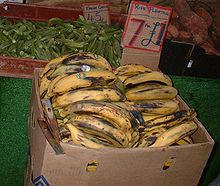Plantain
The plantain , also vegetable banana , plantain or pisang fig , Spanish. Plátano , in Brazil banana-da-terra , in many African languages platan or plantan , is the fruit of many varieties of the banana species Musa × paradisiaca . The plantain is a staple food in many tropical and subtropical regions of America , Africa and Asia (just as important as the potato in Europe) and is suitable as a substitute for celiac patients. In contrast to the dessert banana , it can only be eaten raw when it is fully ripe. This can be recognized by the (almost) completely black discolored skin and the soft flesh. Usually it is boiled or cut into strips or slices and deep-fried or fried . For some time now, it has also been sold in German-speaking countries.
Cultivation

Around 35 million tons of plantains were harvested worldwide in 2016. In the ten largest growing countries, a total of 78.6% of the world harvest was brought in. In a total of 52 countries around 4.7 million hectares were devoted to plantain cultivation.
The plantain achieves only about a third of the yield of the dessert banana; The cultivation of the plantain produced an average of around 7.5 tonnes per hectare in 2016 , although seven times that amount could be harvested under good conditions. The difference is explained by the subsistence character of the plantain cultivation in contrast to the export character of the dessert banana cultivation (20.6 t / ha). The floor cultivation is probably the most ecologically harmless cultivation method because no pesticides against diseases and predators are used here.
| rank | country | Quantity (in t) |
|---|---|---|
| 1 |
|
4,314,910 |
| 2 |
|
3,952,421 |
| 3 |
|
3,710,010 |
| 4th |
|
3,539,252 |
| 5 |
|
3,088,938 |
| 6th |
|
3,074,542 |
| 7th |
|
2,073,995 |
| 8th |
|
1,589,643 |
| 9 |
|
1,108,069 |
| 10 |
|
1,107,729 |
| world | 35.063.803 |
use
The patacon , also called tostón in Spanish, is a dish made from flat pieces of fried plantain. It is a popular dish or side dish in many Latin American countries, but it is not a traditional dish, but has been integrated into the national kitchens.
Kelewele or Kelawele is a popular Ghanaian snack made from fried plantains. In addition to jollofreis and fufu, it is a very typical side dish in Ghana. Kelawele consists of roasted, very spicy plantain slices. The fried slices or cubes of the plantain are served with various spices . The plantain is either cut into slices or into cubes. Ginger , cayenne pepper and salt are the typical Kelawele spices. But onions , anise , cloves , cinnamon or chilli can also be used. Kelawele is a common accompaniment to fish or chicken dishes. Due to the geographic conditions in the country, Kelawele is offered less often in the north, but often from the center of the country to the south.
Aloco (also Alloco or Aloko ) is a West African dish made from plantains fried in palm oil . It is served as a side dish in restaurants in Ivory Coast with a sauce made from onions and tomatoes, but is eaten by the population as a main course.
Matoke , also known as matooke , is a meal made from steamed green plantains and is one of Uganda's national dishes . Usually the plantains are peeled, wrapped in banana leaves and placed in a saucepan. Then the pot filled with water is heated and Matoke is steamed for a few hours. While it's raw white and quite hard, steaming makes matoke soft and yellow. After steaming, matoke is mashed to a pulp while it is still wrapped in the leaves. It is consumed with meat or fish and a sauce made from ground peanuts. In Uganda, the annual per capita consumption of plantains is 172 kg; there they cover about one fifth (18%) of the calorie intake of a household.
Web links
Individual evidence
- ↑ a b FAO production statistics 2016 (crops) , fao.org accessed on January 15, 2018.
- ↑ Steve Haggblade, Reno Dewina: Staple food prices in Uganda . (PDF) p. 1 f.



